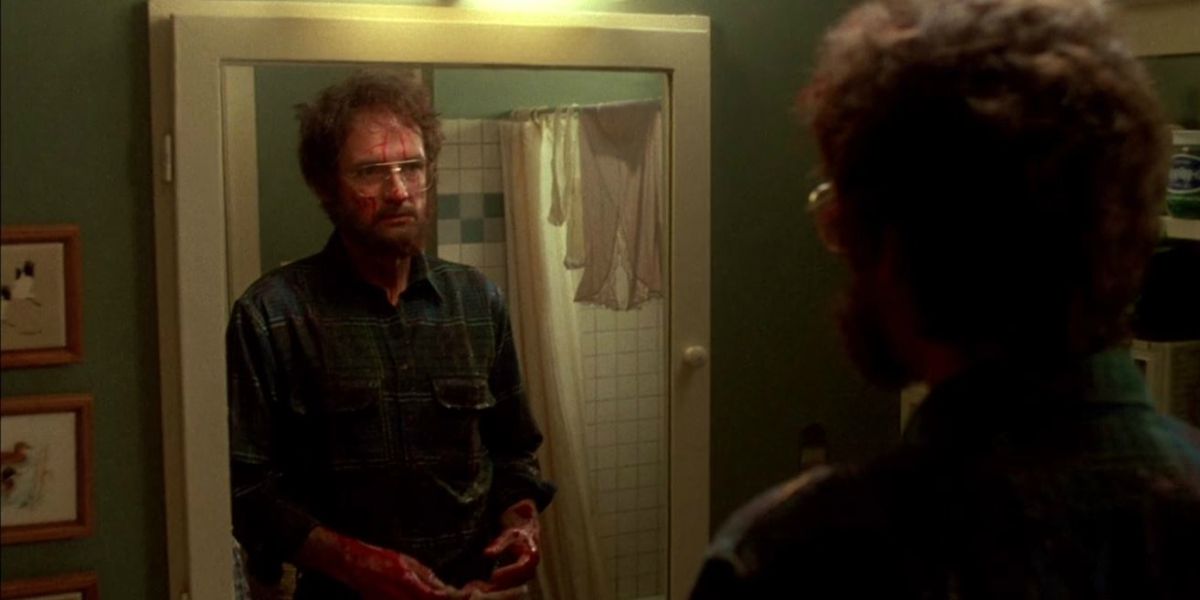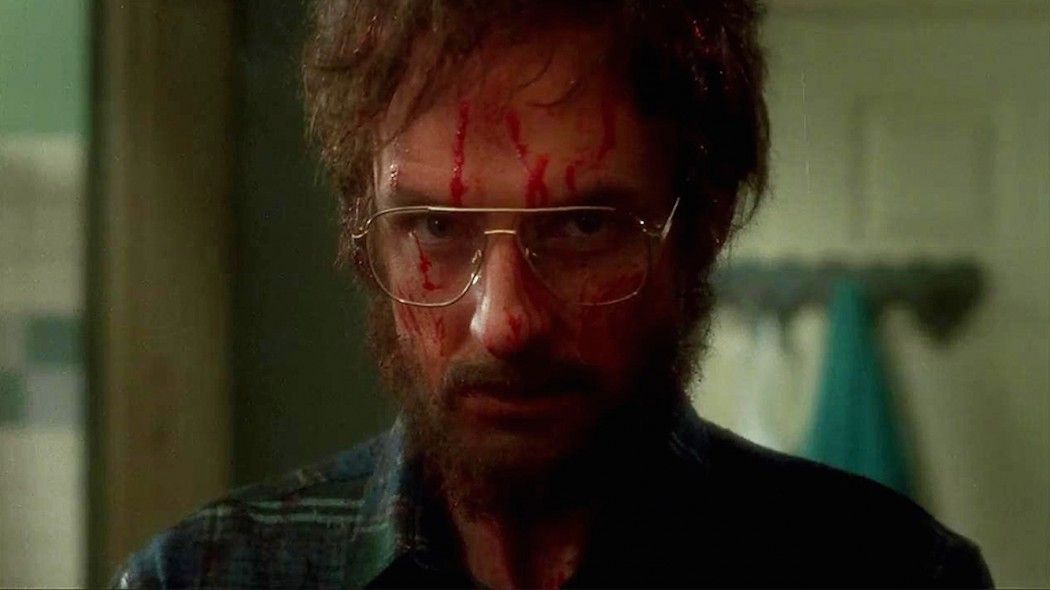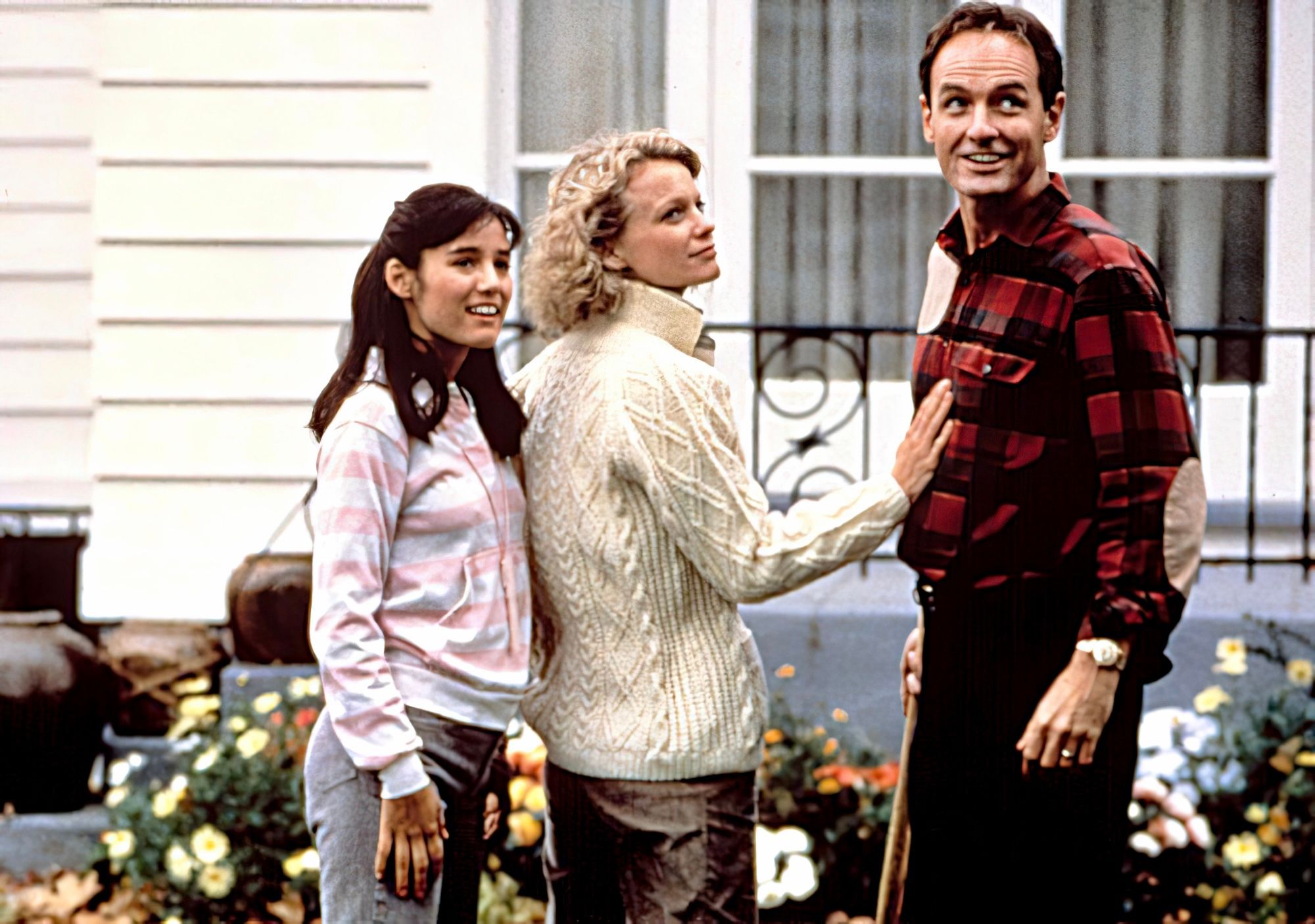Watching Terry O’Quinn descend into murderous fury in The Stepfather is akin to watching a storm brew: from the start there’s no question about his sanity, his moral character, or his ability and willingness to commit heinous crimes to protect his fragile belief, but as his mask of timid domesticity begins to crack, revealing the insidious face underneath, it’s impossible to look away. Thanks largely in part to O’Quinn’s monumental performance, the film works as a slasher picture, albeit an occasionally campy one. But the real meat on the movie’s bones is the richly layered script. Like The Stepford Wives, The Ice Storm, and Vivarium, Joseph Ruben’s 1987 slasher takes a stab at contemporary suburban life while mustering up a poignant message. Hidden beneath the freshly-mowed lawns of The Stepfather, much like the metaphorical hordes of beetles crawling nastily about in Blue Velvet, is a gruesome truth: the preservation of a traditional American family and all its values invariably comes at a cost.
What Is 'The Stepfather' About?
The Stepfather is a violent, biting satire of Reaganist values and those who blindly protect them. Jerry Blake (Terry O’Quinn) is a traditionalist at heart, a man of simple pleasures. More than anything, he’d like to sit down for a nice Thanksgiving dinner with his loving family. He barbecues, is hospitable, and gives speeches of gratitude when his friends and neighbors show up. He builds birdhouses and sticks them onto his lawn. He spends time watching wholesome and innocent Mr. Ed reruns while laughing his butt off. These squeaky-clean characteristics don’t last, though. They can’t. It’s all too dependent on others staying as unquestionably loyal to his traditionalism as he is. Blake’s passivity is circumstantial. He’s only pleasant when things fit into to his ideal.
In one moment Blake is a pillar of his community, a walking image of the ideal father à la Ward Cleaver. In another, he’s a whirlwind, a nearly unstoppable force who tears across all that oppose him in a psychotic fury. He has a perverse obsession with maintaining his traditional family. The thought of it dissolving into something else disturbs him to the point of violence. For Blake, the biggest threat to his idyllic suburban life comes from within: his stepdaughter, Stephanie, a perceptive young woman and a symbol of modernity and clarity, feels discomforted by Blake’s arrival in the family. Still in mourning of her father and succumbing to increasingly dramatic outbursts at school, she raises the suggestion of leaving for boarding school. This simply won’t do. He won’t allow it.
Blake’s alleged love for Stephanie is off-putting. The expectation is that she embraces him as a parent, that she loves him like she would a father. There’s no room in his Christmas card family for anything else. If she leaves for boarding school, there’s no family. It’s just a marriage. And so Blake’s beloved tradition disintegrates. What’s best for her as an individual isn’t his concern. He’s far more interested reserving the family unit by any means necessary.
Despite His Traditional Values, Blake Will Do Anything To Keep His Family 'Perfect,' Even Kill Them
By the time he speaks a single line of dialogue, we already know what he’s capable of. He’s already butchered a family, his family, children and all. In the first scene of the film, we see him walking through the gory aftermath while cheerily whistling “Camptown Races” as if he were simply leaving for a morning drive, like Peter Lorre whistling “In the Hall of the Mountain King” between murdering children in M. From here, he sheds his identity, catches a ferry, and sets off to a Seattle suburb in hopes of trying again.
Under his new identity, Blake meets the widowed Susan Maine (Shelley Hack), mother to a teenaged girl named Stephanie (Jill Schoelen), and the two quickly get married, much to his new stepdaughter’s chagrin. Blake gets a job selling homes to family men that, at least upon first glance, live the kind of lives he approves of. They’re married. They have children. They work good, honest jobs and are tax-paying Americans, family men, true models of tradition. He sees homes as places to build families in. Halfway into the picture, Stephanie’s psychiatrist (Charles Lanyer) poses as a single man in the market for a home in order to set up a showing with Blake and analyze him. Only, Blake’s jarred at the concept of a man without a family buying such a residence. “Houses like this should really have a family,” he says.
That’s all it is for Blake: family. He stays loyal to the outdated family models of 1950s television where men, women, and children have pre-established roles in the home and in society at large. It’s all he cares about. When he kills, he does so for a purpose, twisted as it may be. This isn’t a mindless slasher tearing his way across a cul-de-sac as an incarnation of pure evil. He wants—needs, even—to maintain his carefully constructed image of a happy American family, the kind you’d see on Christmas cards and in half-faded polaroids.
When discussing the recent gruesome murders he committed (incognito, of course, since nobody knows he’s a killer under his secret identity), he coolly shrugs with an explanation, “maybe they disappointed him.” It’s a motive as simple as they come. The house of cards that he precariously built came crumbling down, and he had no interest in salvaging any of the aftermath. To him, it’s pointless. The dream has ended, the illusion dissolved. His prior family, no longer of any use to him, is only fit to be disposed of, and the cycle repeats itself when he meets the Maines.
With the Maines, Blake fails to sculpt his perfect home, though it’s not from a lack of trying. The recurring image of the birdhouse symbolizes Blake’s intention to craft a picturesque home for himself and his family. Unlike a real family, a birdhouse can be built to perfection and without faults. It can stand on his lawn and proclaim to all who see it that a happy family lives there. Ironically, this is how Blake builds his families, too. It’s a facade. There’s nothing there. He’s futilely grasping at concepts that are bound to change. Realistically, there’s nothing wrong with Stephanie going to boarding school. In fact, it would probably be good for her. It could allow her the space she needs to grieve her father, to come into her own as an adult. But it doesn’t adhere to the tradition.
Boarding school is an arbitrary plot point that could have been any number of things while remaining its importance. It isn’t boarding school itself, but the very concept that Stephanie would leave her “parents” on their own that disturbs Blake. He holds the same contempt to the idea of Stephanie growing older. Her growing interest in things romantic similarly discomforts Blake, as seen when he finds her kissing her boyfriend (Jeff Schultz) on the doorstep one evening. Unforgiving and stern, Blake steps in and breaks up the tender moment with disgust. “You could go to jail...this girl is sixteen years old!” Blake threatens. “So am I!” the boy sheepishly replies.
Blake Has No Patience For Boys With His New Daughter
Stephanie sharing her first kiss with her boyfriend is an innocent moment. They’re two young people with mutual romantic interest. As teenagers, they do as teenagers do and express their affection and attraction through physical means. Still, Blake sees this as something perverse. He’s stuck in his old-fashioned ideologies where such behavior is vulgar. To him, it goes against the all-important meaning of life: build a family, a classical one, and live with them for the rest of your life. It’s all he means to do. It’s why he works, it’s why he keeps a job, and it’s why he sells houses. “Sometimes I truly believe that what I sell is the American Dream,” he says cheerily to his friends and neighbors at his barbecue, and he absolutely means it. But, that’s why they call it the American Dream, as George Carlin always says, “because you have to be asleep to believe it.”
Blake has no ability to accept the fact that the Traditional American Family is largely outdated. Times are bound to change, and change, though intimidating, is often a good thing. Letting go of some traditional American values—or concepts that once made the country what it is, for better or worse—allows for the country and everybody in it new opportunities. It allows education. It allows inclusion. It allows for people to listen to other opinions, ideas, concepts. It allows for people to become more accepting, less strict and uncompromising in their ideals.
Though The Stepfather turned a critical reflection towards Reagan-era politics of returning to tradition, its satirical edge will continue to keep its bite for as long as such unwavering devotions to tradition remain. Blake’s obsession towards days of eras past is uncannily familiar to large waves of the contemporary political landscape. Cries for a return to vaguely-defined glory days force a misunderstanding of progress, vilifying a procedure which is by its own definition something beneficial.
'The Stepfather' Isn't a Time Capsule of a Distant Era
In 2022, The Stepfather isn’t a time capsule of a distant era—it’s a sobering and truthful reflection of the detrimental nature of traditionalism. Through Blake’s psychotic rampage, there’s something to be learned: change is inevitable, and it’s quite often a good thing. We can learn from the past. We can improve from it.
By the end of The Stepfather, Blake fails to preserve his concept of family. His wife and stepdaughter overcome his tyrannical rule, and together they build something different but better. They aren’t concerned with keeping things as they were simply for the sake of preservation. Instead, they can move on and prosper. That Blake’s very existence is a facade built upon barbaric violence and dishonesty doesn’t faze him. It’s all that he knows. When, after overcoming the looming threat of violence from her stepfather, Stephanie demolishes the birdhouse the two of them had erected, she frees herself from the constraints of the idyllic-yet-false lifestyle. It’s a liberating moment—and something to be inspired by.
"traditional" - Google News
October 31, 2022 at 05:45AM
https://ift.tt/qgywuZS
The Stepfather Remains a Timely Satire of Traditional Values - Collider
"traditional" - Google News
https://ift.tt/qMRZTN3
Shoes Man Tutorial
Pos News Update
Meme Update
Korean Entertainment News
Japan News Update
Bagikan Berita Ini

















0 Response to "The Stepfather Remains a Timely Satire of Traditional Values - Collider"
Post a Comment